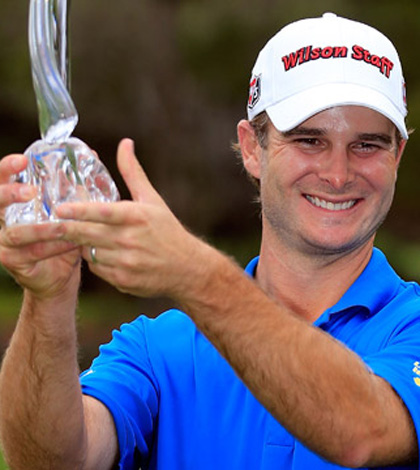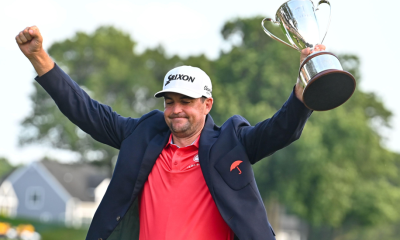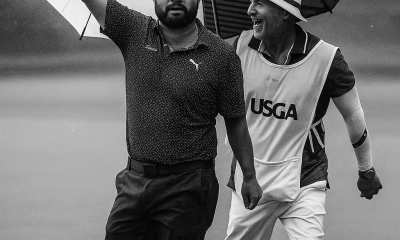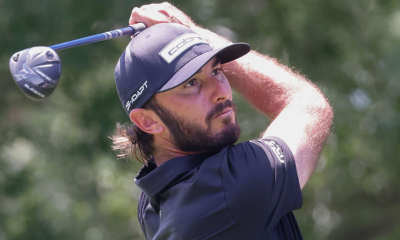Opinion & Analysis
The Basics to Projecting Tour Winners

Each week on my blog, I pick 10 players to win the PGA Tournament at hand. This is based on historical data as to what type of players the particular golf course favors along with three-year, five-year and 10-year averages in order to determine what holes are most critical to having success in the tournament and what players are most likely to play those holes the best. With the picks, I list the actual Vegas odds of the player being the outright winner of the tournament.
A couple of weeks ago in an interview with Matt Adams on his “Fairways of Life” show, he asked me to pick a winner and a dark horse for the Tampa Bay Championship. I selected Adam Scott as the favorite who was at 14:1 odds to win the tournament. But, the data suggested that Kevin Streelman was likely to play well at the tournament and I mentioned that he was my dark horse pick who was at 200:1 odds. Streelman went on to make me look really smart by winning his first PGA Tour event of his career and his first win in any tournament in five years since he won his local club championship in Arizona.
While there are some courses that certain golfers just seem to play well because the course fits their eye, it is very obvious that certain courses tend to favor players with certain strengths in their game. This week’s Shell Houston Open favors bombers as the course is fairly forgiving off the tee and each of the par-5s are very long. A course like Pebble tends to favor putting (Brandt Snedeker won) because the greens are so difficult to putt on. And a course like Innisbrook tends to favor driving and what I call “danger zone” play (shots from 175-225 yards); both of which Streelman has done exceptionally well this year.
However, as I continued to make picks I started to notice that Vegas’ odds were fairly accurate. There would be times that the data would heavily favor a certain player and when I would look up his odds, they would end up being a long shot to win and then he would put forth a poor performance. It’s the old mantra of “Vegas knows something we don’t.”
Eventually, I started to see what Vegas favors when it comes to making odds: performance in previous events.
While it is not the most accurate way to pick winners, I think that if a person can get a good idea of the style of game a course favors and the player’s performance in previous events, that person can better pick players for a fantasy golf leagues. I also think it gives a good idea of how important confidence and momentum is to a golfer’s success on Tour.
First, here’s a look over the last five years of the tournament winners and what they did in the tournament the previous week (made cut, missed cut or did not play).
I did not count winners who played a WGC event in the previous week since there is no cut in those tournaments. I did count the first event of the FedEx playoffs, which is usually the Wyndham Championship. But, I did not count the rest of the playoffs since the design of the playoff system would skew the data.
With that said, we still see these results:
Made Cut Prior Week: 64 out of 166 players (38.6 percent)
Did Not Play Prior Week: 79 out of 166 players (47.6 percent)
Missed Cut Prior Week: 23 out of 166 players (13.9 percent)
There are few interesting parts here. For starters, 86.2 percent of the winners in the last five years on Tour either made the cut or did not play in the prior week’s tournament. The other is that the winners were more likely to have not played in the previous week’s event than to have made the cut in the previous week’s event. Lastly, many of the winners that did miss the cut in the previous week’s event won at a minor event like the Puerto Rico Open or they missed the cut in a major and won the following week.
I think this shows how important confidence and momentum can be for a player’s success on Tour. That is why Steve Stricker’s limited schedule makes sense. A golfer can struggle in a tournament, take a week or two off to regroup and have better odds of winning the next tournament than if he plays in a tournament and continues to miss cuts. And if you’re a player who has made a cut in a tournament, you probably should look to continue to ride that streak as it may lead to victory.
I also found another commonality in winners on Tour in that they have played in that tournament at least once before. Here’s a look at the winners from the past five years and whether or not they had played in the tournament previously.
For regular Tour events, I only looked at tournaments where the same course was played in the previous year. For Majors, I counted any player who had played in that Major before. But once again, 86.2 percent of the winners over the past five years have previous experience in the tournament they won.
With that, over the last five years there was less than a 2 percent chance that a winner would be a golfer who had no tournament experience and missed the cut in the previous week’s tournament.
Therefore, I believe winning on Tour has a lot to do with getting a course that suits a player’s strengths, a player that has been playing fairly well recently and a player who has some sort of experience playing the tournament before. Mix in a little bit of luck and great things can happen.
But, for those of you who like to play in fantasy golf leagues or play the Vegas odds, I think this gives a general guideline of what players to avoid picking.
Opinion & Analysis
The 2 primary challenges golf equipment companies face

As the editor-in-chief of this website and an observer of the GolfWRX forums and other online golf equipment discourse for over a decade, I’m pretty well attuned to the grunts and grumbles of a significant portion of the golf equipment purchasing spectrum. And before you accuse me of lording above all in some digital ivory tower, I’d like to offer that I worked at golf courses (public and private) for years prior to picking up my pen, so I’m well-versed in the non-degenerate golf equipment consumers out there. I touched (green)grass (retail)!
Complaints about the ills of and related to the OEMs usually follow some version of: Product cycles are too short for real innovation, tour equipment isn’t the same as retail (which is largely not true, by the way), too much is invested in marketing and not enough in R&D, top staffer X hasn’t even put the new driver in play, so it’s obviously not superior to the previous generation, prices are too high, and on and on.
Without digging into the merits of any of these claims, which I believe are mostly red herrings, I’d like to bring into view of our rangefinder what I believe to be the two primary difficulties golf equipment companies face.
One: As Terry Koehler, back when he was the CEO of Ben Hogan, told me at the time of the Ft Worth irons launch, if you can’t regularly hit the golf ball in a coin-sized area in the middle of the face, there’s not a ton that iron technology can do for you. Now, this is less true now with respect to irons than when he said it, and is less and less true by degrees as the clubs get larger (utilities, fairways, hybrids, drivers), but there remains a great deal of golf equipment truth in that statement. Think about it — which is to say, in TL;DR fashion, get lessons from a qualified instructor who will teach you about the fundamentals of repeatable impact and how the golf swing works, not just offer band-aid fixes. If you can’t repeatably deliver the golf club to the golf ball in something resembling the manner it was designed for, how can you expect to be getting the most out of the club — put another way, the maximum value from your investment?
Similarly, game improvement equipment can only improve your game if you game it. In other words, get fit for the clubs you ought to be playing rather than filling the bag with the ones you wish you could hit or used to be able to hit. Of course, don’t do this if you don’t care about performance and just want to hit a forged blade while playing off an 18 handicap. That’s absolutely fine. There were plenty of members in clubs back in the day playing Hogan Apex or Mizuno MP-32 irons who had no business doing so from a ballstriking standpoint, but they enjoyed their look, feel, and complementary qualities to their Gatsby hats and cashmere sweaters. Do what brings you a measure of joy in this maddening game.
Now, the second issue. This is not a plea for non-conforming equipment; rather, it is a statement of fact. USGA/R&A limits on every facet of golf equipment are detrimental to golf equipment manufacturers. Sure, you know this, but do you think about it as it applies to almost every element of equipment? A 500cc driver would be inherently more forgiving than a 460cc, as one with a COR measurement in excess of 0.83. 50-inch shafts. Box grooves. And on and on.
Would fewer regulations be objectively bad for the game? Would this erode its soul? Fortunately, that’s beside the point of this exercise, which is merely to point out the facts. The fact, in this case, is that equipment restrictions and regulations are the slaughterbench of an abundance of innovation in the golf equipment space. Is this for the best? Well, now I’ve asked the question twice and might as well give a partial response, I guess my answer to that would be, “It depends on what type of golf you’re playing and who you’re playing it with.”
For my part, I don’t mind embarrassing myself with vintage blades and persimmons chasing after the quasi-spiritual elevation of a well-struck shot, but that’s just me. Plenty of folks don’t give a damn if their grooves are conforming. Plenty of folks think the folks in Liberty Corner ought to add a prison to the museum for such offences. And those are just a few of the considerations for the amateur game — which doesn’t get inside the gallery ropes of the pro game…
Different strokes in the game of golf, in my humble opinion.
Anyway, I believe equipment company engineers are genuinely trying to build better equipment year over year. The marketing departments are trying to find ways to make this equipment appeal to the broadest segment of the golf market possible. All of this against (1) the backdrop of — at least for now — firm product cycles. And golfers who, with their ~15 average handicap (men), for the most part, are not striping the golf ball like Tiger in his prime and seem to have less and less time year over year to practice and improve. (2) Regulations that massively restrict what they’re able to do…
That’s the landscape as I see it and the real headwinds for golf equipment companies. No doubt, there’s more I haven’t considered, but I think the previous is a better — and better faith — point of departure when formulating any serious commentary on the golf equipment world than some of the more cynical and conspiratorial takes I hear.
Agree? Disagree? Think I’m worthy of an Adam Hadwin-esque security guard tackle? Let me know in the comments.
@golfoncbs The infamous Adam Hadwin tackle ? #golf #fyp #canada #pgatour #adamhadwin ? Ghibli-style nostalgic waltz – MaSssuguMusic
Podcasts
Fore Love of Golf: Introducing a new club concept

Episode #16 brings us Cliff McKinney. Cliff is the founder of Old Charlie Golf Club, a new club, and concept, to be built in the Florida panhandle. The model is quite interesting and aims to make great, private golf more affordable. We hope you enjoy the show!
Opinion & Analysis
On Scottie Scheffler wondering ‘What’s the point of winning?’

Last week, I came across a reel from BBC Sport on Instagram featuring Scottie Scheffler speaking to the media ahead of The Open at Royal Portrush. In it, he shared that he often wonders what the point is of wanting to win tournaments so badly — especially when he knows, deep down, that it doesn’t lead to a truly fulfilling life.
View this post on Instagram
“Is it great to be able to win tournaments and to accomplish the things I have in the game of golf? Yeah, it brings tears to my eyes just to think about it because I’ve literally worked my entire life to be good at this sport,” Scheffler said. “To have that kind of sense of accomplishment, I think, is a pretty cool feeling. To get to live out your dreams is very special, but at the end of the day, I’m not out here to inspire the next generation of golfers. I’m not out here to inspire someone to be the best player in the world, because what’s the point?”
Ironically — or perhaps perfectly — he went on to win the claret jug.
That question — what’s the point of winning? — cuts straight to the heart of the human journey.
As someone who’s spent over two decades in the trenches of professional golf, and in deep study of the mental, emotional, and spiritual dimensions of the game, I see Scottie’s inner conflict as a sign of soul evolution in motion.
I came to golf late. I wasn’t a junior standout or college All-American. At 27, I left a steady corporate job to see if I could be on the PGA Tour starting as a 14-handicap, average-length hitter. Over the years, my journey has been defined less by trophies and more by the relentless effort to navigate the deeply inequitable and gated system of professional golf — an effort that ultimately turned inward and helped me evolve as both a golfer and a person.
One perspective that helped me make sense of this inner dissonance around competition and our culture’s tendency to overvalue winning is the idea of soul evolution.
The University of Virginia’s Division of Perceptual Studies has done extensive research on reincarnation, and Netflix’s Surviving Death (Episode 6) explores the topic, too. Whether you take it literally or metaphorically, the idea that we’re on a long arc of growth — from beginner to sage elder — offers a profound perspective.
If you accept the premise literally, then terms like “young soul” and “old soul” start to hold meaning. However, even if we set the word “soul” aside, it’s easy to see that different levels of life experience produce different worldviews.
Newer souls — or people in earlier stages of their development — may be curious and kind but still lack discernment or depth. There is a naivety, and they don’t yet question as deeply, tending to see things in black and white, partly because certainty feels safer than confronting the unknown.
As we gain more experience, we begin to experiment. We test limits. We chase extreme external goals — sometimes at the expense of health, relationships, or inner peace — still operating from hunger, ambition, and the fragility of the ego.
It’s a necessary stage, but often a turbulent and unfulfilling one.
David Duval fell off the map after reaching World No. 1. Bubba Watson had his own “Is this it?” moment with his caddie, Ted Scott, after winning the Masters.
In Aaron Rodgers: Enigma, reflecting on his 2011 Super Bowl win, Rodgers said:
“Now I’ve accomplished the only thing that I really, really wanted to do in my life. Now what? I was like, ‘Did I aim at the wrong thing? Did I spend too much time thinking about stuff that ultimately doesn’t give you true happiness?’”
Jim Carrey once said, “I think everybody should get rich and famous and do everything they ever dreamed of so they can see that it’s not the answer.”
Eventually, though, something shifts.
We begin to see in shades of gray. Winning, dominating, accumulating—these pursuits lose their shine. The rewards feel more fleeting. Living in a constant state of fight-or-flight makes us feel alive, yes, but not happy and joyful.
Compassion begins to replace ambition. Love, presence, and gratitude become more fulfilling than status, profits, or trophies. We crave balance over burnout. Collaboration over competition. Meaning over metrics.
Interestingly, if we zoom out, we can apply this same model to nations and cultures. Countries, like people, have a collective “soul stage” made up of the individuals within them.
Take the United States, for example. I’d place it as a mid-level soul: highly competitive and deeply driven, but still learning emotional maturity. Still uncomfortable with nuance. Still believing that more is always better. Despite its global wins, the U.S. currently ranks just 23rd in happiness (as of 2025). You might liken it to a gifted teenager—bold, eager, and ambitious, but angsty and still figuring out how to live well and in balance. As much as a parent wants to protect their child, sometimes the child has to make their own mistakes to truly grow.
So when Scottie Scheffler wonders what the point of winning is, I don’t see someone losing strength.
I see someone evolving.
He’s beginning to look beyond the leaderboard. Beyond metrics of success that carry a lower vibration. And yet, in a poetic twist, Scheffler did go on to win The Open. But that only reinforces the point: even at the pinnacle, the question remains. And if more of us in the golf and sports world — and in U.S. culture at large — started asking similar questions, we might discover that the more meaningful trophy isn’t about accumulating or beating others at all costs.
It’s about awakening and evolving to something more than winning could ever promise.
























Blanco
Mar 31, 2013 at 11:01 pm
Really interesting article. I always suspected your methodology would be a safe bet, but have never had the time or wherewithal to get all those tidbits… Any good sites that provide concise summaries of lesser known player’s strengths/weaknesses? Maybe another that gives info about the course, it’s tournament setup, and changes to the layout from year to year?